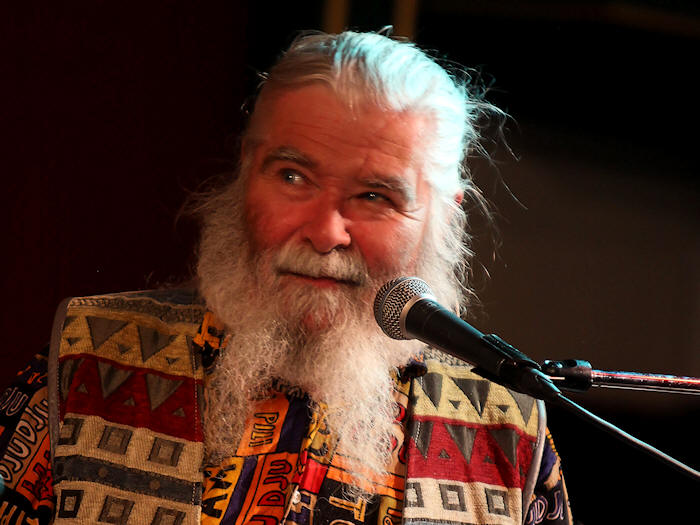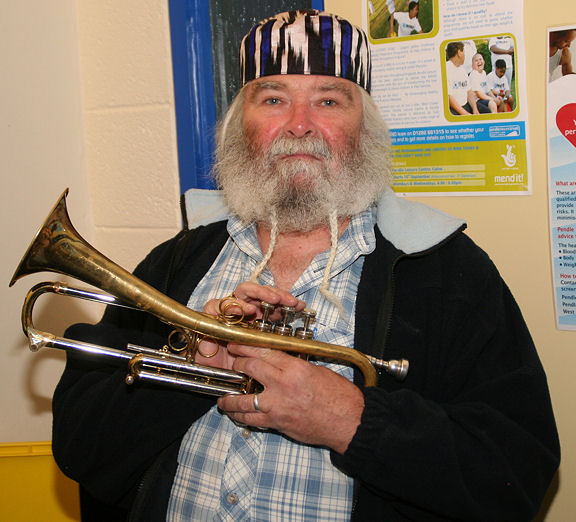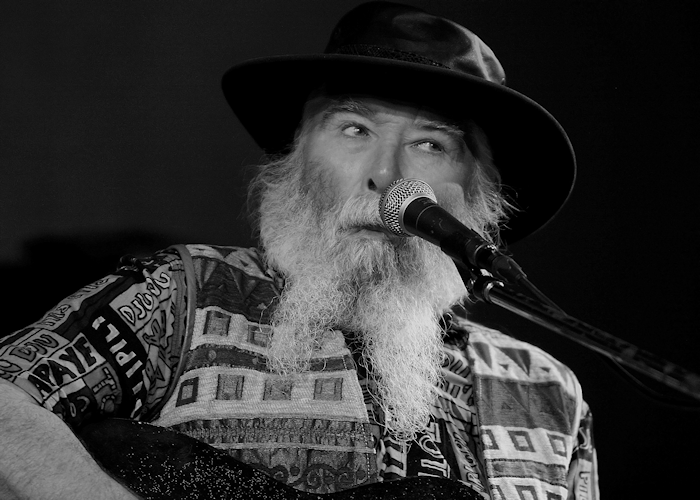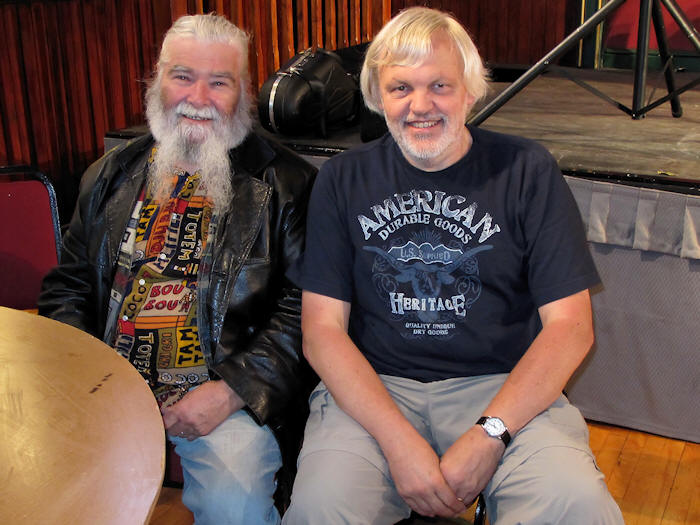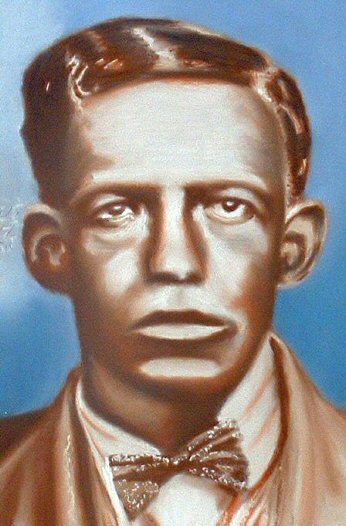
Painting © 2004 Loz
Arkle
Website
© Copyright 2000-2011 Alan White - All
Rights Reserved
Site optimised for Microsoft Internet Explorer
Early Blues Interview
|
|
"Manchester born blues legend Victor Brox is probably one of the most underrated champions of the British Blues scene and its unsung hero. This may well have been because he has refused to be pigeon-holed into any single category and has produced an eclectic style which often defied analysis. What cannot be disputed is his excellent singing voice, musical virtuosity and total eccentricity. He was described by Jimi Hendrix and Tina Turner as their favourite white blues singer. He is without doubt a national treasure. He has worked with: Eric Clapton, Jimi Hendrix, Ritchie Blackmore and Ian Gillan of Deep Purple, Charlie Mingus, Memphis Slim, Dr. John, Aynsley Dunbar, Graham Bond, Alexis Korner, John Mayall, Country Joe McDonald, Keith Moon, Bill Coleman and Screaming Lord Sutch. In 1970 Victor performed as Caiaphas on the original recording of Tom Rice and Andrew Lloyd Webber's Jesus Christ Superstar. In 1998 he appeared as a 'look-alike' of Leonardo da Vinci in the motion picture Ever After. Victor has very talented children, with the youngest being blues singer Klya Brox (see interview). His ex-wife Annette helped Victor form his early blues bands and she often performs as an opera singer." Source: Wikipedia and
Soulbot
As Victor now lives in France he is rarely seen in England, however Kyla kindly arranged for me to interview Victor at a Klya Brox Band gig (more of a 'family get-together') in Uppermill, Saddleworth ... Alan: Youíve been in the music business for many years, but what are your first musical memories growing up in Manchester? Victor: I had my own band when I was about 12, in Droylsden, Manchester, and we had a sort of, well we were playing mostly Jelly Roll Morton compositions Ė I think I was playing banjo at the time. We used to rehearse in my Mumís front room because we had a piano there. We used to play at St. Maryís Church Hall in Droylsden for dances. I was very keen on blues and I got to meet Big Bill Broonzy and Brownie McGee and Sonny Terry, and it was through blues that I came to jazz. My first love was blues and Iíve been operating in the jazz field as well over the years but blues has remained constant as the main string to my bow. Alan: Did you come from a musical family? Victor: My mother was musical and her father was a very fine singer. She played the piano and the mandolin, and sang. But my grandfather was an excellent singer, born in Manchester to an Irish family and he sang all the way through the first world war, right up to the time he died. He used to play the bones [as an instrument]; he had a butcherís shop and heíd make his own bones and heíd play different rhythms with both hands and he taught me to whistle. Alan: Did you always want to become a musician? Victor: Right up to the time I was in university I was told that I was destined to be a medical missionary. But I became progressively more disillusioned with that. I was always keen on music, played the violin from the age of 10 but I never expected to become an official musician because I didnít anticipate what would ever be the means to do it. I used to go to the Northern Jazz Federation record meetings all over Lancashire, when I was their mascot because I was in my early teens and they were all, well Iíd have said then that they were old men, but they were probably only 30 and 40. I got to hear some fantastic recordings. This is long before the age of LP records, let alone CDs. 78s were all that were available and they were quite rare to hear genuine jazz and blues at that time. But I was absolutely obsessed with it and that was my grounding. I never anticipated becoming a professional musician. When I graduated from university in philosophy I decided that what I wanted to do was play the trumpet so I went to Spain, to Ibiza. Iíd been through Barcelona the year before and seen Bill Coleman who I thought was a very good jazz trumpet player, so I went to Barcelona to try and get lessons from him. Heíd moved on of course by then so I went on to Ibiza and there were a lot of good musicians on that island. This was 1962/63 and it was unknown. Charlie Mingus had said that he was going to go and live there so quite a few jazz musicians from Europe and America were there and I got to play with them, so that was a good grounding for me. When I came back I met Kylaís mother and we decided to get married and form a band. And so I had to start trying to make some money out of it. I had my own band before I went to university, we used to play down in the centre of Manchester. I gave John Mayall his first paid work! But I never really thought of it as a way of making a living until I was absolutely forced to. Eventually I had to become a school teacher because I couldnít really make it work when the children started to come along. Then I gave up teaching and became a professional band leader with The Blues Train and then I was asked to join Alexis Korner and the Aynsley Dunbar Retaliation, which involved moving down to London. I had a lot of opportunity to meet a lot of the bluesmen because they used to come up here to play for Granada. Johnnie Hamp [British television producer] was very keen on blues so he used to get a lot of the Blues and Gospel Caravan to come over from America nearly every year so I got to know quite a lot of them. I backed some of them too, like Little Walter and Muddy Waters, and people like that.
Alan: In the Ď70s you were very influential in creating the Manchester music scene. Tell me a little about how that developed. Victor: I left teaching and I left my own band and jumped at this opportunity to join Alexis Korner and went to London. My band carried on but at the end of the 60s it split up and several of the band joined Frank Zappa and I formed my own band from the remnants, and a big gospel band. Iíd met these gospel singers because Iíd sung on the original album of Jesus Christ Superstar and I used the Trinidad Singers and some of the other musicians plus Kylaís mum, Annette, so we had a very big gospel influenced soul band with six girl singers. It was quite immense and we did one paid gig and recorded one record and that was the end of that. But I formed another band which was quite big. I used to live next door to a band called The Family and there was another band on our street called The Action and they became Mighty Baby, and I got some musicians from that band. That continued for quite a while and I was playing with Graham Bond and then things started to peter out at the beginning of the 70s, the music scene changed a lot and I joined Screaming Lord Sutch for a while. Eventually I moved back to Manchester because my family was getting bigger and I went back into teaching. At the same time I reformed the Victor Brox Blues Train and various members of the band went on to form the ..... we had a very zany line up and did a lot of performance art as well. But the music never suffered, it was always Ray Charles, John Coltrane, Ornette Coleman, Prince Buster, John Lee Hooker, Muddy Waters, Aretha Franklin, James Brown Ė quite a wide range of stuff. I formed a music company called Music Force and went down to work with Vanessa and Colin Redgrave, Jim Allen, Tom Kempinski, people like that. Worked at the Empire Pool Wembley with the Road to Workers Power. They tried to get me involved in the political side but I said Iím a musician not a politician. But the musiciansí union was very weak and poor at the time, for example they were refusing to allow American jazz musicians to come over to this country so it was a very strange scene. So we formed our alternative co-operative and did quite a lot of concerts and had a lot of bands. The more people who joined the less radical it became and I fell out of sympathy with it in the end. A lot of those people went on to form bands like Sad Cafe, and The Oxford Road Show started from that. I was never interested in the commercial side of music, I was only interested in what I considered to be creative jazz or blues, and the rest was of little interest.
Alan: I read that one of your greatest fans was Jimi Hendrix and that you actually jammed with him. Victor: Back then Jimi loved Aynsley Dunbarís playing and wanted him for the Experience but Chas Chandler wanted Mitch Mitchell partly because of his image Ė he had long ringlets Ė and Aynsley was a like a little Mod from Liverpool at the time with sellotaped-down hair. So Aynsley never joined them but he was Jimiís personal choice and whenever The Retaliation was on at the Speakeasy Hendrix would come down and play with us and he told me that I was his favourite white singer. We became good friends and he came to play with us in New York as well. That was an extraordinary night, Ritchie Havens was there, Leonard Cohen (who lives in Manchester now), Jimi Hendrix, Janis Joplin, me, Aynsley Dunbar and The Retaliation. That was quite a night, as you can imagine!
Alan: Youíve played with an amazing arrange of big names Ė BB King, Eric Clapton, Muddy Waters. Victor: I never played with Eric Clapton on gigs because politically we didnít agree. I have none the less recorded with him. He was one of the musicians engaged to play on the Dr John album, 'The Sun, Moon & Herbs', which I was engaged on. It took place over a week in London and various people would come in. One night there was Mick Jagger doing backing vocals and another night there was Eric Clapton playing guitar. Alan: Of all the people youíve played with, who do you admire the most? Victor: Itís very hard to say. I like Lonnie Johnson, the great guitarist. Iíve got a lovely picture of me and Kylaís mother and Lonnie Johnson in the 60s. I think he was the first person ever to record Iím not rough as a guitar solo with the Louis Armstrong Hot Five, and he did a single string guitar solo which was quite remarkable. I think that was the very first guitar jazz solo, I think it predates any of the bebop records. Itís almost impossible to say who I admire the most, although I very much admire Little Walter and Muddy Waters. One of my favourite singers, two favourite singers, one who I still hope to get the chance to see is Bobby Blue Bland. I wrote the sleeve notes to one of his LPs when I was very young called 'Ainít Nothing You Can Do'. The other person I never got to see which Iím bitterly disappointed about was Howliní Wolf. I used to sing quite like him at one point but then I got sick of people asking me to do it and I decided it was preferable to sing as myself rather than imitating him.
Alan: Who would you say influenced you most in your music writing? Victor: Probably Ray Charles because he did a lot of different things very well Ė he wrote, he sang, he played keyboards, saxophone. I was lucky enough to meet him once at the Free Trade Hall in Manchester. We didnít have any money but we managed to get back stage because we said Annette, my wife, was one of the Raylettes. She obviously wasnít! I also very much admired Theolonius Monk and the other person more latterly was Dizzy Gillespie who I squeezed up against in a taxi, interviewed him and held his Dizzy Horn. The last concert he did in Manchester he had a singer with him called Flora Purim, the wife of Airto Moreira, the great percussionist, and while she was on stage he had a little break, went off to have a pee and said, ďHere, hold my trumpet manĒ. I went to the hotel with him and managed to get an interview with him for a jazz magazine I was writing for at the time. Alan: Also in the 60's you formed the 'Victor Brox Blues Train' with your wife Annette, and at one time it was nicknamed 'The Child Slavery Band', tell me about this. Victor: Iíve been fired by my own band on more than one occasion and on this particular occasion I was very pissed off. It was the second time in a year Iíd been fired by my own band and I still donít know why. Iím friendly with all the people that were responsible now, but it was a bit disappointing at the time to turn up for a gig to find your bandís playing and they donít want you to play. Usually the promoter was absolutely furious. I put it down to jealousy and envy and general intrigue. But on this particular occasion I had a gig the next night and I couldnít find any musicians but I was determined that they werenít going to do it and I was going to do it, so I looked around and the only people I could see were my own children so they became my band. That was when Kyla was 11, Danny was 12. Danny agreed to play bass, although heíd never played bass. Phil was the oldest member at 15, and my son, Sam, was 13. People looked and said, ďItís Victorís Child Slavery BandĒ. Itís actually the band youíll see tonight, more or less Ė Danny, Phil and Kyla are in it.
Alan: Thereís not much information Iíve
managed to glean on this, but in 1969 you were involved in the 'Sweet
Pain Sessions' releasing the 'Sweet Pain' album which I believe
featured Dick Heckstall-Smith (tenor/soprano sax), John O'Leary (harp),
Stuart Cowell (guitar) Keith Tillman (bass), Aynsley Dunbar (drums),
yourself (piano/trumpet), and your wife Annette (vocals), Tell me about
the band and the making of the album.
Victor: I used to love to play violin and especially the viola but itís very hard to say. I still like the trumpet, and guitar. Alan: Are there any particular songs that have special meaning to you? Victor: All the songs I wrote of course. I wrote a song called 'Whiskey Head Woman' which changed to be 'The Dream' and thatís stood the test of time. Thereís some extraordinary stories behind that song and what happened to it. And one that I really like is 'Double-Loving', which is the one that Hendrix called the best white guitar solo every recorded. I donít play the solo, John Moore did that, but I produced the song. Kyla's recorded it as well. I wrote an entire opera based on the life history and work of Hieronymous Bosch. [see footnote (2) below] One of the songs from that, 'It's a Beautiful Sunrise', which Annette, Kyla's mother sings was one of our singles. Itís very hard to say really, I obviously much like all my songs but some of those from that opera were particularly good. I recorded one with The Gospel Truth, 'In This Time of Trouble', was a very good song and there is another called 'Casparís Song' where Iím singing in the guise of one of the Three Wise Men is Annette's favourite song. I suppose the last one I wrote is usually my favourite song! Alan: You now have a very talented musical family: Kyla with her own blues band, Buffy and Anna, both singers, and Sam also with his own band; you must be very proud of them. Victor: I am. I'm hoping to have Kyla and Buffy singing with me tonight but weíll have to see. Alan: Finally, how do you see the future of blues music?
Alan: We have to keep it alive as much as we can. Victor: I will! Alan: Thanks very much indeed Victor.
Notes: _________________________________________________________________________
'Sick and Tired' one of Victor's own compositions
recorded at
Kyla and Victor Brox with the Kyla Brox Band, recorded at
Return to
Blues Interviews List |








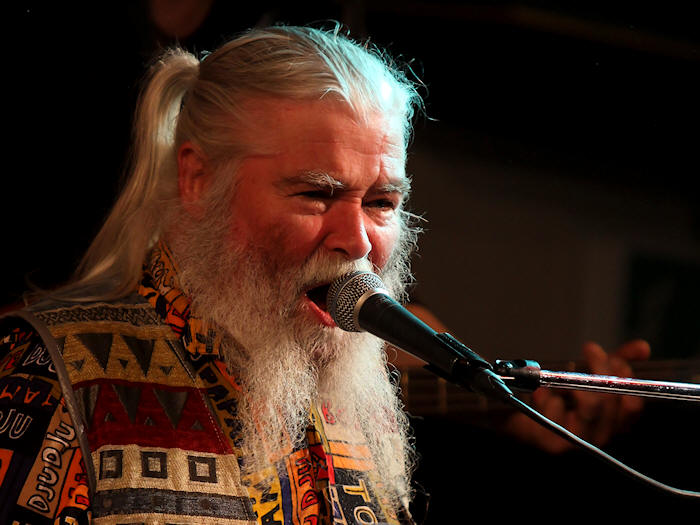
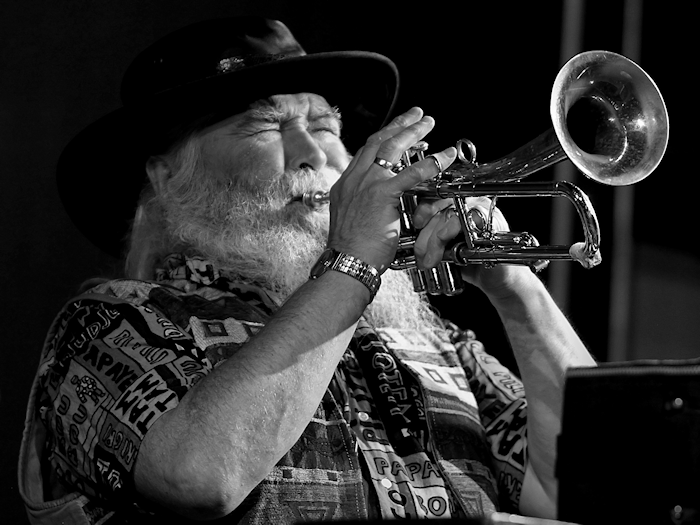
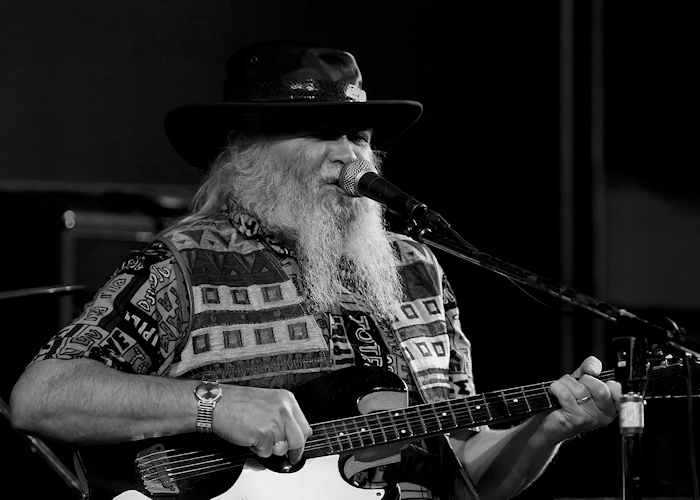
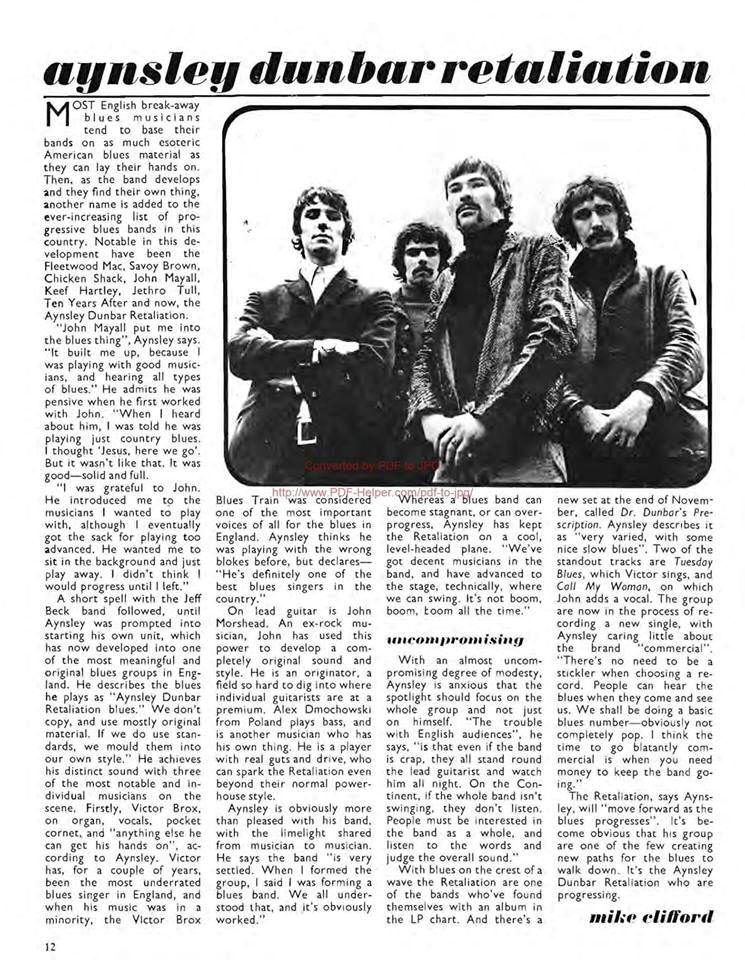
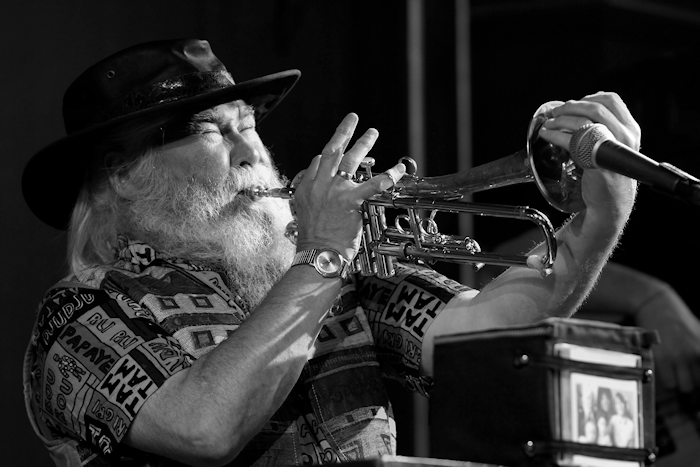
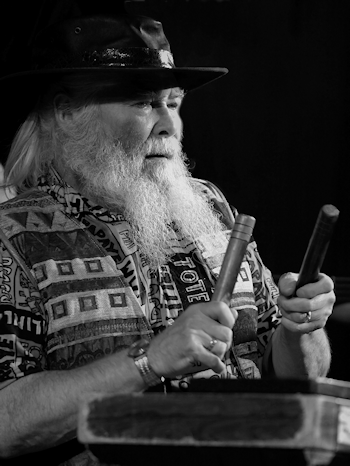 Alan:
You are respected as a musical virtuoso,
playing trumpet, guitar and keyboards, as well as performing vocals;
what is your favourite instrument?
Alan:
You are respected as a musical virtuoso,
playing trumpet, guitar and keyboards, as well as performing vocals;
what is your favourite instrument?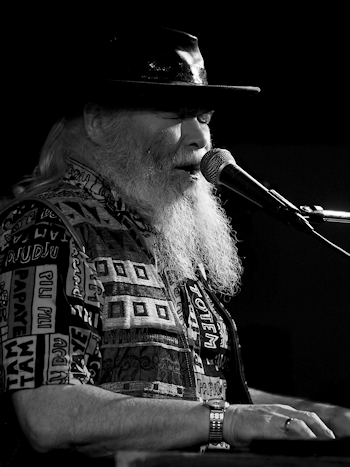 Victor: I donít think itís
got a future. I think itís on the way out. There is nobody coming up
to take over and thereís not really any interest in it. Itís very sad
but thereís no interest in America whatsoever and very little in
Britain. The key place for blues at the moment is Belgium where they
are crazy about the blues. Iím hoping to stimulate interest in Japan.
Itís a shame because itís a perfect medium for improvisation and it
combines the best of poetry and soulful music and dance. Itís the root
of most modern popular music but itís a long apprenticeship. Blues is
basically music based on the human voice and to become a blues singer is
like a 20 year apprenticeship unless you are very extraordinary indeed.
In this day of Andy Warholís famous 15 minutes people donít want to
spend 20 years learning an art with no guaranteed outlet at the end of
it. Hardly anybody wants to be a blues singer. Kyla says, ďMost of my
audience Dad are your ageĒ, when she goes to play at the blues clubs,
much older than she is, and sheís 30 so sheís past the age of pop music
anyway. You see some people who want to play guitar like Jimi Hendrix
and thereís always a few people who want to play slide guitar but itís
nothing like in the old days when you could hear a blues band everywhere
and there was a big market for it. There isnít any more and people
arenít interested in it. Or very few, and not enough to make a
commercial audience. I think itíll become even more specialist and
select curiosity. I sincerely hope Iím wrong but I really donít see
anything emerging which merits highly. I havenít seen a really good
blues band for a long time and I travel all over the world. The LA
blues scene is so derivative and nobody believes in it, and they are all
white people anyway. I think there probably are some ancient and middle
aged blues men still around but young black people want to do rap, or at
the worst, soul music and modern R&B which has no relation to blues.
Itís a great shame but I donít see much future there.
Victor: I donít think itís
got a future. I think itís on the way out. There is nobody coming up
to take over and thereís not really any interest in it. Itís very sad
but thereís no interest in America whatsoever and very little in
Britain. The key place for blues at the moment is Belgium where they
are crazy about the blues. Iím hoping to stimulate interest in Japan.
Itís a shame because itís a perfect medium for improvisation and it
combines the best of poetry and soulful music and dance. Itís the root
of most modern popular music but itís a long apprenticeship. Blues is
basically music based on the human voice and to become a blues singer is
like a 20 year apprenticeship unless you are very extraordinary indeed.
In this day of Andy Warholís famous 15 minutes people donít want to
spend 20 years learning an art with no guaranteed outlet at the end of
it. Hardly anybody wants to be a blues singer. Kyla says, ďMost of my
audience Dad are your ageĒ, when she goes to play at the blues clubs,
much older than she is, and sheís 30 so sheís past the age of pop music
anyway. You see some people who want to play guitar like Jimi Hendrix
and thereís always a few people who want to play slide guitar but itís
nothing like in the old days when you could hear a blues band everywhere
and there was a big market for it. There isnít any more and people
arenít interested in it. Or very few, and not enough to make a
commercial audience. I think itíll become even more specialist and
select curiosity. I sincerely hope Iím wrong but I really donít see
anything emerging which merits highly. I havenít seen a really good
blues band for a long time and I travel all over the world. The LA
blues scene is so derivative and nobody believes in it, and they are all
white people anyway. I think there probably are some ancient and middle
aged blues men still around but young black people want to do rap, or at
the worst, soul music and modern R&B which has no relation to blues.
Itís a great shame but I donít see much future there.